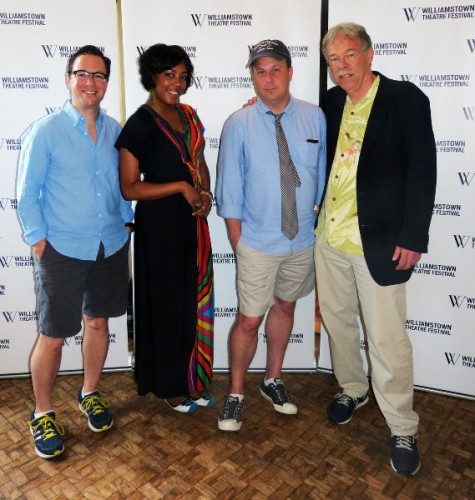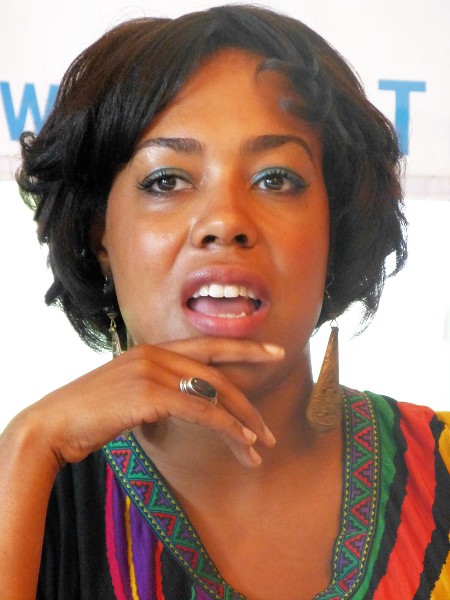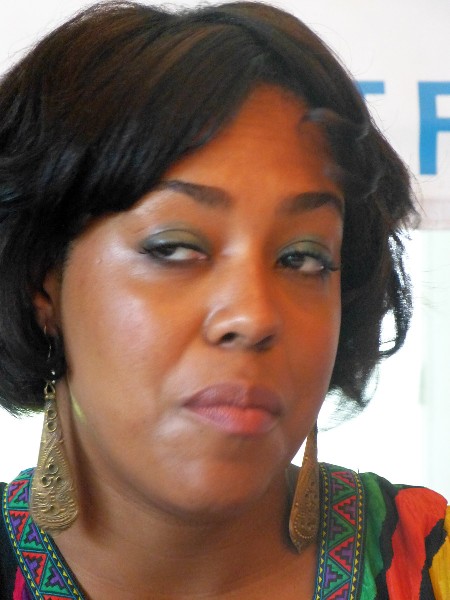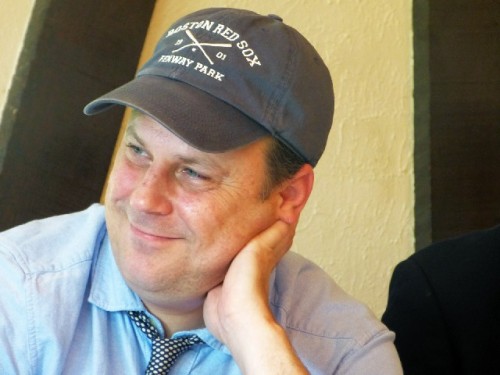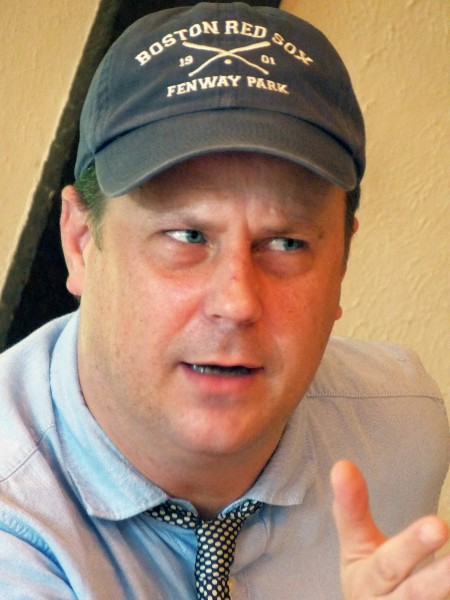Batter Up for Johnny Baseball at Williamstown
Controversial ART Musical Steals Second Base
By: Charles Giuliano - Jul 11, 2013
Of the seven productions in the tight as a drum season for Williamstown Theatre Festival an astonishing three are musicals.
The Main Stage opened with a revival of the Marx Brothers vehicle Animal Crackers. On August 1, also on the Main Stage, with Pygmalion in between, is a New York bound new work adapted from the film Bridges of Madison County. In January it begins previews at the Gerald Schoenfeld Theatre on 45th Street. During a press conference this week at the Williams Inn there were updates on Johnny Baseball, July 24 to August 3, on the Nikos Stage. It features a book by Richard Dresser, who was present, music by Robert Reale, lyrics by Willie Reale, and choreography by Denis Jones. The director, Gordon Greenberg, actress De’Adre Aziza, and Brooks Ashmanskas, a WTF veteran actor who plays four characters, discussed the production.
The degree of difficulty of presenting three musicals, one revival and two under development is off the charts. It is a signifier of the ambition of Jenny Gersten, now in the third and final year of a contract, in her first gig as artistic director of a major, American regional theatre company.
If it works, which is all in poker for Gersten, from here on out the sky’s the limit.
Per aspera ad astra.
A baseball themed musical about the Boston Red Sox and its “Curse of the Bambino” seems like a sure thing.
In a June 4, 2010 review for its premiere at American Repertory Theatre, however, former Boston Globe critic, Louise Kennedy, wrote a scorcher.
“So is it a hit? Well, that will be up to the fans, of course. But from the press box, it looks like a solid double: a lively story that will please diehard fans and rookies alike, some clever lyrics . . . and a score that is, alas, more of a square than a diamond.
“That’s not to say the songs are awful; they’re just a bit flat-footed, on the whole, and too many of them sound alike. Many start out promisingly, with a few ingenious turns of phrase or amusing rhymes, but then the plod-plod-plod of the rhythms and the aimless, vaguely old-fashioned feel of the melodies sends them crashing into the dust.”
In contemporary American theatre it is rare that musicals which aren’t instant hits get a second chance.
With candor Gersten disclosed that her husband is “Still a part of” the creative team for Johnny Baseball and “I’m still involved with him.” More than keeping it in the family, however, Gersten really believes in this musical. With extensive revisions and six new songs it deserves another shot.
What a gutsy call.
Actually, Berkshire Fine Arts flagged it as a hit. In a review of the ART production Mark Favermann wrote “Will Johnny Baseball make a squib hit or a home run? The players finally took the field--I mean stage. Batter up! And the game was played. The winners were the audience. Happily and wonderfully, Johnny Baseball is a true Big Leaguer.”
When the floor was opened for questions I asked about the love/ hate relationship between critics and the productions we review.
The night before, during Broadway in the Berkshires at Shakespeare & Company, Tony winner, Tonya Pinkins, described how just five critics shuttered her first Broadway show Sondheim’s Merrily We Roll Along. It closed after previews and just 18 performances. Pinkins read a poignant letter she wrote at the time to director Hal Prince. She told us that the musical is currently a hit in London.
Globe reviewer Kennedy brought her young son to the opening night of Johnny Baseball and reacted harshly to strong, adult language in the production. I asked about the fallout from her review. How does that incident underscore the delicate relationship between critics, their editorial autonomy, peer review, and ability to shut down new productions?
Kennedy wrote that “Ultimately, ‘Johnny Baseball’ wants to teach a small part of a familiar lesson — we should all learn to get along, and people should be free to love whom they please — within a feel-good musical. Given the theme, it’s just wrong that some of the show’s jokes are cheaply homophobic, but that’s the only even remotely political remark that could be made about a show that celebrates baseball, multiculturalism, and the American way…”
Richard Dresser responded. “I would like to clarify something about Louise Kennedy. It’s the only time I have ever responded to a critic. In the review she referred to the ‘homophobic’ aspect of the script. It was so clearly not true. I wrote a letter to the Globe and after that she lost her job. And I feel really good. (reaction) No, I really do. She brought her kid to the show. I found out later that she admitted that she wrote quickly to meet a deadline. Other people in the office said ‘You’re going to get into trouble saying that.’ There was literally no basis for it.
“I just wanted to make that point. It’s difficult when it’s one person’s point of view. It’s a whole other thing when it’s rushed and it’s a review that really isn’t telling the truth about a show.
“Generally I feel like there’s nothing to be done. You have to accept it. That was a case where I could not accept it. It’s very tricky business responding to critics on any level.”
De’Adre Aziza added that “One of the things that people don’t think about in critical responses is audience development. If you take five different people who have their own viewpoints and political stances- race, sex, whatever- and you have different productions that are about different things, maybe different culturally, and you have this one person with their viewpoint responding to those different things. Tying into that is like what is the audience development for this production?
“Maybe you don’t like this show because you know nothing about baseball. You don’t like jazz and you don’t like entertainment. But. You have these baseball fans that love this show. There are people who love the ‘20s and ‘30s entertainment era. They love this show. And it’s like making sure you find the right audience for the show. A lot of audiences tend to be pretty homogenous acrossss (emphasis) the board.
“If you take five different Broadway productions about many different things, many different eras, and the audience is pretty much the same. But I think if more of an effort were made to really open theatre up to everyone, and get different perspectives from different types of audiences, that would then inform the critical response. Because you have to take it as a whole how the audience is responding to the piece and everything. If you ignore that you’re not doing your job.”
Here may I differ? There are shows that audiences love which leave me cold. Of course there are shows that I find deeply moving that audiences fail to respond to. So, as a critic, it is not my job to survey the audience before writing a review. It’s my mandate as a professional to evaluate the show and not just act as a cheer leader or traffic cop.
“If you get an atypical audience seeing something that you’re not interested in but you’re in the experience” Aziza continued. “In that room you have to write from that standpoint. So that plays into it also.”
Again, sorry, I disagree. When a play presents a social or political issue to a partisan audience the mandate is to review it as theatre. The critic must be independent of the agit-prop of the creators which is but one of a number of factors in its emotional impact.
Gersten said “Here in the Berkshires we have so many options. There are so many things which we can go see. We need all the different critics to tell us what’s going on. We don’t have that 800 pound gorilla, like the major cities, to put that stamp on it. But what I do find so wonderful about producing here is how discerning this audience is. They’ll read a bad review and still try a show. They’ll still form their own opinion. I respect how hungry and curious the Berkshire audience is.”
We followed up with Dresser. “That was such a great question. I felt a bit of a moral obligation (to publicly respond to Kennedy). I hadn’t read the review. I often don’t read reviews. Some of the gay actors in the show came to me and said you ought to see what’s being written about your show. I read the review and was livid. The show is absolutely the opposite of that. It’s so inclusive and positive. A friend whose daughter is gay said to me that today there is so much comedy that’s at the expense of gay people. She said that she just felt so good about the show.”
I asked isn’t it the nature of comedy that humor is often at somebody’s expense.
“I guess that’s true” he said laughing “Comedy is not nice. It is at somebody’s expense. I don’t have rules for it. But at least be honest about what the work is. As I recall she liked the show. (About the role of critics and his relationship) It’s hard to characterize because you’re all different. Some people come with an agenda and some type words meant for the side of a bus because they know that it will be seen and quoted. We’re in the same business. I’m trying to build a career as are you and we both judge how we’re going to do it.
“Every once in a while there’s something a critic will write which really illuminates something. Sometimes it happens sometimes it doesn’t. Some years ago I did a play in Saint Louis. There was a critic for the New York Times and he praised it. The play came to New York with basically the same cast and the same critic savaged it.
“I don’t read reviews as much as I used to because it really interferes with what I do. I have no hard and fast rules. I’m all about getting up in the morning and figuring out the best way to do this. If I feel a review is going to get in my way I won’t read it. Everybody has fixed in their heads these judgments which have been passed about their work. I don’t particularly like having that take up room in my head.
“A major league umpire calling the balls and strikes has reached the pinnacle of the profession. Where a critic is keeping an eye on his career.”
On the continuing development of Johnny Baseball with six new songs and revisions we asked what was learned from the ART production?
“The three of were very collaborative” he said. “We look at the show in as pragmatic a way as we can. Here’s a great story. It’s a very entertaining show. Audiences like it. It’s really about something. I felt that I had written a love story which was not compelling. We had presented the racism in the wrong way. We were telling the audience things that they already knew. So there was a new goal which I set for myself. Write about this relationship between a black woman and white man where they never discuss race. Until they have to. It’s not like we don’t get along because I’m black. It’s more like you never do the laundry.”
Today it is ever more difficult to develop musicals. Formerly, there were out of town, trial runs in Boston and New Haven. Now a show is fine tuned on Broadway with rehearsals then a month or so of previews. Shows, particularly musicals, may not be ready by opening night. In regional theatre for new shows it’s either an instant hit or one and out. This second chance at WTF is all too rare. How does that equate to pressure?
“It’s a lot of pressure” he said. “You try things which may or may not work. You can see that with an audience in previews. That’s how we work… Today theatre is very risk aversive. Theatres want to hold onto subscribers. I talk to artistic directors and you hear about subscribers, money, and how hard it is to sustain (regional theatre companies). About ten years ago there was a company in trouble. They said we’re just going to do comedies. I write comedy. That’s great. But it’s such a condescending way of looking at it. Audiences really want something they can’t get on television. If you do something pre tested, pre marketed, and pre approved it’s very safe. There’s nothing to go to the theatre for.”
What’s next for Johnny Baseball after Williamstown?
“I believe this show is going to have a life” he said. “It may be an unconventional one. We would love to have the show go to New York. If it doesn’t go to New York, that’s not the end of Johnny Baseball. We just did a student production of it at the University of Maine. It was for the community and not just students. People really get it. It’s entertaining. Although theatre is more risk averse we are finding ways to get our work out there. Maybe in a counter intuitive way. If you just wait by the phone for a producer to call and say ‘I’m going to take your show to Broadway’ well that’s great when it happens. If it doesn’t happen that way we’re not going to give up on this show.
“We’re worked on this show for a long time. We had the idea in 2003. Fortunately we didn’t work on it for the first year. The Red Sox won (The World Series) in 2004. We thought ok that’s the end of the show. We all do other things. A lot of it was written in 29 hour workshops. It’s like college. We stay up all night. We write more and write more. That’s Equity rules. You do a 29 hour rehearsal then a public presentation. We’ve done three or four of those. They’re really fun to do.”
Why baseball as America’s Game?
“It’s about fathers and sons” he said. “I used to coach Little League. I wrote a play about it. Rounding Third (The tumultuous journey of two Little League coaches through an entire season from their first tentative meeting to the climactic championship game. Don believes in winning at all costs, Michael thinks the team should just have fun. Out of these conflicting philosophies, the real issue of the play emerges: How should we raise our children?) There’s something about fathers and sons playing catch. A lot of dads think they have unique insights into baseball. The father of every son I coached thought their kid was uniquely gifted and probably headed to the major leagues.”
We asked Dresser if he had played the game.
“Oh yes” he said. “I was a catcher. I could always hit. I was a good catcher except for one thing. I could hit. I played Babe Ruth and was varsity in high school. But I didn’t have the arm strength to throw the runner out at second base. It’s such a quick arm release. There was a game where I had two triples, a double, and a single. They stole eleven bases on me. “
Hopefully, Dresser’s Johnny Baseball will knock a grand slam over the Green Monster in Williamstown.

